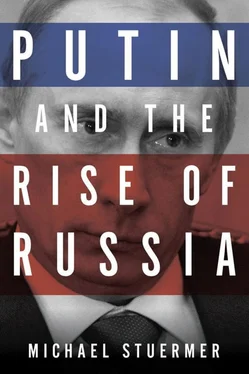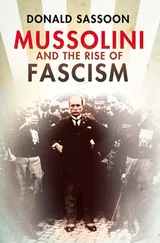Was NEC the announcement of a new Cold War? Karaganov and whoever else helped in preparing that memo took a more balanced view, remembering that throughout the rest of the world Russia has few friends, and some of those of doubtful reputation and value. Surely the honeymoon of the early 1990s is over. But the Europeans are by far Russia’s number one partner for imports and exports, and the strategic relationship with the US is indispensable for bestowing on Russia the coveted status of the other world power. To what extent a future relationship with the US would be based on antagonism, to what extent on partnership would be decided case by case, without sentimentality or grace. But maintaining the non-proliferation regime in working order (including keeping Iran away from bomb-grade enrichment of uranium) is surely among the essentials common to both powers. Russian entry into the World Trade Organization would be difficult to achieve against a US veto, and the same would apply to OECD membership. Altogether, Karaganov understands a few important things: on the one hand the Russian regime needs a foreign enemy to maintain discipline at home; a little diplomatic deterrence cannot do much harm but will earn respect. On the other hand, from the preservation of the non-proliferation regime to cyber security and the fight against Islamic militancy, Russia and the West have strategic and overriding interests in common, and another arms competition as in the past would be costly, wasteful and destructive – most of all for Russia. So the NEC will stop short of a new Cold War. But the West should prepare for, from time to time, resentful rhetoric, displays of military-industrial prowess, and the occasional spell of cold weather from the East.
Status quo or Russia resurgent?
The overriding question, for Europeans as much as for the rest of the world, is about Russia’s long-term Grand Strategy. Is there a repeating pattern which would correspond to something like a grand design, administered and executed from within the Kremlin? And, if so, what would be, for better or worse, the distinctive elements? Cold War or no, after the hopes and illusions of the 1990s had vanished, and the United States turned from a policy of balance and respect for Russia to a concept of hegemony and disregard, there is still ‘the West’. Even where ‘the West’ is deeply divided, seen from Moscow it is still a defining concept.
Russia resurgent: the question for the West is whether the new, post-Soviet Russia sees itself as a status quo power or as a force for revolutionary change – and will act accordingly. What is abundantly clear, before Putin threw down the gauntlet at the Munich Security Conference in February 2007, and even more so afterwards, that the time is past when Russia came, cap in hand, and asked for loans.
Russia’s leaders and the vast majority of the Russian people do not wish to relive the past, not Stalin’s brutal regime, not the modest civility after, not the ‘leaden years’ of Brezhnev, and not the phased breakdown that followed. The year One in the modern Russian calendar is when the oil price began to rise; when the rouble came back to life and mutated into a convertible hard currency; when, after a calamitous pause, pensions and salaries began to be paid. No wonder that Putin, the man who happened to preside over the Russian economic miracle, is seen as the man of destiny, saviour of the nation and guarantor of a modest, hitherto unknown measure of happiness.
Russians count their new era as beginning in 1999-2000, and there are plenty of reasons to do so, not least the widely shared assumption that the new era is fragile, that too much depends on the steady flow of oil and gas and continuing high prices, and that, between Western democracy and Russian authoritarianism everything is still in flux. In many respects Russia is still caught in the past. That the legacy must be overcome is precisely where the Russian people and their leaders seem to agree. This needs, among other things, a fair amount of working together with Western countries, not least the US. The new era of limited and controlled confrontation is as much a reality as the need to cooperate on overriding concerns. ‘The earth is flat’ – Thomas Friedman argues with some conviction. That means that, inevitably, what unites Russia and the West is more important than what divides them. Too much is at stake for Russia, just as for other big players in the Great Game.
Russia today is no longer out to collect all of the Slavic soil and soul in its own hands, nor is Russia any longer in the business of world revolution. The Russia of today is not a revolutionary power, nor is it content to leave things as they are. If there is a long-term, sustainable strategy it has two main aspects, one old-fashioned, one ultra-modern. The modern one means control of energy resources, pipelines and LNG technologies worldwide, possibly forming, in spite of many protestations to the contrary, a kind of Gas OPEC. The more traditional one is to create dependence, protect investment, secure friendly governments and put soldiers, if possible, on both sides of the border.
The most dynamic dimension of Russian foreign policy is not foreign policy at all – at least not within the established ‘Westphalian system’ (Robert Cooper) of states, sovereignty and equilibrium. It is a new kind of trans-imperialism based on control of enough oil and gas to determine much of what happens in the world market, and on the availability of enough funds to create a global system. This helps to keep prices stable and, even more important, to hedge against the kind of crises that made the oil price crash twice, in the mid-1980s and again in 1997-98.
Gazprom, the state monopoly, is the most important instrument of this strategy. The home base for Gazprom, however, is weaker than it looks. Investment has been low, in fact insufficient to keep current levels of extraction beyond 2010. Foreign companies like Royal Dutch Shell and BP have been shown the door out of Eastern Siberia so that Gazprom can gain full control in Sakhalin II and get rid of the production-sharing agreements of the 1990s – Russia’s equivalent to the ‘unequal treaties’ which the Chinese never tire of complaining about. But while Gazprom is congratulating itself on achieving 100 per cent control, the technology imported from Western companies in exchange for energy is almost impossible to replace.
Furthermore, domestic consumption continues to grow and does so at giveaway prices – for Gazprom directors it must be torture to observe how much costly gas, instead of being sold for dollars worldwide, is just being wasted because domestic prices are low, individual consumption cannot be accounted for, and opening windows is still the preferred method of regulating temperature at home. But raising gas prices in the face of public discontent, when inflation is driving up the price of foodstuffs, is not something the Kremlin wants to try.
The dynamic side of Russian foreign policy is to a large extent about oil and gas, increasingly in the form of LNG. Energy is part and parcel of a post-modern grand strategy that has grown out of Soviet energy policies ever since the first oil crunch after 1973, has experienced ups and downs, and is now being used to provide reassurance to the Kremlin as much as to the nation at large.
Moscow’s rulers have done everything possible to control pipelines far beyond their own turf – not unlike the Chinese or, for that matter, the United States. The US-sponsored and part-financed Baku-Ceyhan oil-pipeline, following the same logic, was built at the same time as the older Russian systems, bypassing the northern slopes of the Caucasus en route to Novorossiysk on the Black Sea, were growing more and more ramshackle due not only to the wars in Chechnya and trouble in nearby Daghestan but also as the natural result of neglect and inefficiency.
Читать дальше











